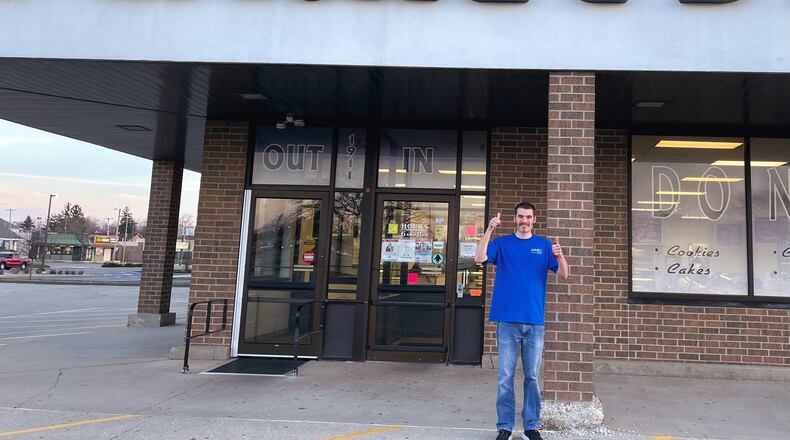“I was born in Springfield, but we moved around a lot,” McKinster said. “I went to many different schools.”
By high school, McKinster was enrolled in the Miami Valley Career Technology Center (MVCTC) after attending his first two years at Tecumseh High School. At MVCTC, he trained for specific jobs through Goodwill Industries and other programs. But after graduation he struggled to make a livable wage.
Then six years ago, his father-in-law helped connect him to TAC and it changed everything for the now 31-year-old.
“I started working at TAC on second shift then moved to first shift,” McKinster said. “I worked everywhere — in the greenhouse, the sewing and clay and pottery areas.”
TAC trains people with disabilities through work in their own buildings and prepares them to work for local businesses and companies. The program teaches people about the responsibilities around a job, including attendance and task completion. There are also lessons about problem solving, social interaction, motor skill development and safety.
While working in the greenhouse, McKinster learned about a program called Fresh Abilities, a TAC quick service salad restaurant that uses ingredients grown in their greenhouses and helps train people for jobs in the food service industry.
“I learned to cut up lettuce, work the cash register and everything else,” McKinster said.
Then in 2019, McKinster had an opportunity to work at Schuler’s Bakery in Springfield. McKinster started working at the bakery on a probationary basis and was so successful that he was soon offered full-time employment.
“I work from 8 to 2 every day,” McKinster said. “I mostly make cookies. I put the dough through the machine, and I cut it and put them on trays and then freeze them. When they are ready, the decorators finish them.”
Not only does McKinster say he loves his job, but he also enjoys the people on his team.
Madalyn Rowland, also of Springfield, met McKinster about a year ago when he was hired to be a second-shift job coach at Fresh Abilities. She assisted him throughout the process of getting placed and eventually hired at Schuler’s.
“I worked alongside Chad and supplemented any training he received,” Rowland said. “He began with the responsibility of producing sugar cookies and when a full-time job became available, he secured that position.”
Throughout McKinster’s training, Rowland helped him to learn time management skills and his responsibilities, but she said that ultimately his success came from his own drive and abilities.
“Once we are given a case like Chad’s, we meet with the person and help them figure out interests,” Rowland said. “Then we determine their comfort levels with co-workers, the company and the job. We help them identify any natural support they might have.”
Eventually, said Rowland, clients start to “get the hang of it,” and she can begin fading to the background.
“At first we start stepping away, but are still available for the entire shift,” Rowland said. “This is important because they know they have the support, and they can count on me to help them if they need it.”
Rowland said that McKinster’s situation is the best-case scenario and he quickly moved from group employment to being independent. Though he does not have a driver’s license, he knows how to get transportation so he can get to his job and return home again.
“Chad is really a good model for what we do at TAC because everything has worked out so perfectly,” Rowland said. “He has overcome a lot of barriers from starting his job and finally being ready to head out the door to a job in the community. It’s all we want for our individuals at TAC.”
Contact this contributing writer at banspach@ymail.com.
About the Author

